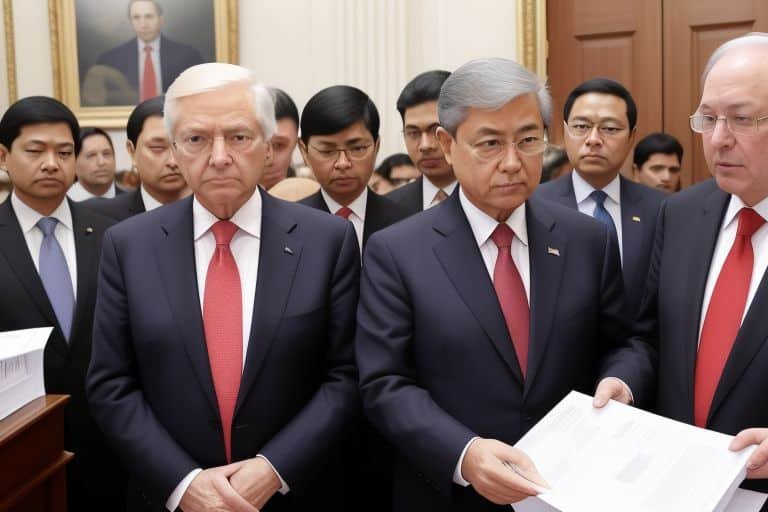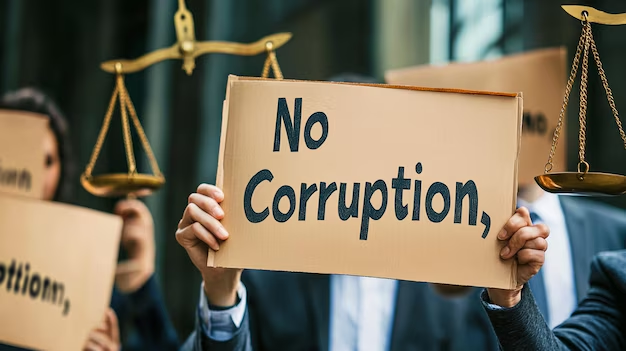Political corruption is a phenomenon as old as politics itself. Despite the lofty ideals of governance—justice, equality, and the protection of rights—corruption often festers behind closed doors. It is the dark underbelly of political systems worldwide, from democracies to dictatorships. Corruption erodes public trust, distorts the fair functioning of government institutions, and ultimately undermines democracy and economic stability.
In this article, we delve into the hidden world of political corruption, uncovering its causes, manifestations, and impacts, and explore the ways in which it can be addressed.
What is Political Corruption?
Political corruption is the use of political power for personal gain or benefit. It involves government officials, elected representatives, and other political actors engaging in unethical or illegal activities to serve their own interests rather than those of the public. This can include embezzlement, bribery, nepotism, electoral fraud, and other forms of misconduct.
Corruption thrives in environments where transparency and accountability are lacking. When political actors prioritize self-interest over the common good, corruption finds fertile ground. The consequences can be devastating for societies, resulting in misallocated resources, weakened institutions, and greater social inequality.
Forms of Political Corruption

Political corruption takes many forms, each contributing to the erosion of governance in its own way. Some of the most common types include:
1. Bribery
Bribery is the offering, giving, or receiving of something of value in exchange for influence or action in a political or official capacity. It often involves wealthy individuals, corporations, or foreign entities seeking to sway government decisions in their favor.
2. Embezzlement
Embezzlement occurs when government officials misappropriate public funds for personal use. This type of corruption not only weakens the economy but also robs the public of essential services like healthcare, education, and infrastructure.
3. Nepotism and Cronyism
These forms of corruption involve favoring friends, family, or close associates in the allocation of jobs, contracts, or other political appointments. Nepotism undermines meritocracy and can lead to incompetent governance.
4. Electoral Fraud
Electoral fraud occurs when politicians manipulate election results to maintain or gain power. This can include vote rigging, intimidation, or altering election laws to disenfranchise certain groups.
5. Lobbying and Influence Peddling
While lobbying is legal in many countries, it often blurs the line between legitimate advocacy and corrupt influence. When politicians are unduly swayed by wealthy lobbyists, it distorts policymaking, often to the detriment of the wider population.
6. Money Laundering
Political corruption frequently goes hand-in-hand with financial crimes. Corrupt officials often engage in money laundering to hide the origins of their ill-gotten wealth, making it harder to trace and punish.
Causes of Political Corruption

Several factors contribute to the prevalence of political corruption:
- Weak Institutions: Corruption flourishes in countries where institutions like the judiciary, law enforcement, and regulatory bodies are ineffective or compromised.
- Lack of Transparency: When government processes are opaque, it becomes easier for officials to hide corrupt practices.
- Concentration of Power: In systems where power is concentrated in the hands of a few individuals, there is a greater risk of abuse of that power for personal gain.
- Cultural Factors: In some countries, corruption is ingrained in the political culture, where citizens expect to pay bribes or offer favors to get things done.
- Economic Inequality: High levels of poverty and inequality can exacerbate corruption, as people with fewer opportunities may resort to illicit means to survive.
The Impacts of Political Corruption

The effects of political corruption are wide-reaching, affecting almost every aspect of society:
1. Erosion of Trust in Government
Corruption erodes public trust in government institutions, leading to cynicism, apathy, and disillusionment among citizens. When people lose faith in their leaders, they may disengage from the democratic process, weakening the very foundation of democracy.
2. Stifling Economic Growth
Corruption distorts market mechanisms, deters foreign investment, and reduces public sector efficiency. It often leads to the misallocation of resources, where funds that should be spent on public services are diverted into private pockets. This weakens the economy and perpetuates poverty.
3. Social Inequality
Corruption disproportionately affects the poor and marginalized, as they are often the most reliant on public services and least able to afford bribes. It perpetuates inequality and social divisions, fostering resentment and unrest.
4. Weakened Rule of Law
When corrupt officials are not held accountable, the rule of law is undermined. This creates a culture of impunity, where people in power believe they can act without consequences. It also weakens the judiciary and law enforcement agencies tasked with maintaining order.
5. Political Instability
In countries with high levels of corruption, public dissatisfaction can lead to protests, social unrest, and even political upheaval. Corruption destabilizes governments, often paving the way for authoritarianism or military intervention.
Addressing Political Corruption
Combatting political corruption requires a multifaceted approach. Here are some key strategies:
- Strengthening Institutions: Building strong, independent institutions that can check political power is crucial. This includes an independent judiciary, effective anti-corruption agencies, and a free press.
- Transparency and Accountability: Increasing transparency in government processes, from campaign finance to public procurement, can help deter corruption. Holding politicians accountable through regular audits and investigations is essential.
- Public Engagement: Educating citizens about their rights and the dangers of corruption can empower them to demand better governance. Civil society organizations play a crucial role in holding governments accountable.
- International Cooperation: Corruption often crosses borders, especially when it involves money laundering or offshore accounts. International cooperation is key to tracking and prosecuting corrupt officials.
Also Read : Money, Influence, And Corruption: The Undermining Of Public Trust
Conclusion
Political corruption is a pervasive issue that undermines the integrity of governments and harms societies across the globe. It is a symptom of deeper structural issues, including weak institutions, economic inequality, and the concentration of power. While eradicating corruption may seem like an uphill battle, progress can be made through stronger accountability mechanisms, public engagement, and international cooperation.
By shining a light on corruption and holding those in power accountable, societies can work towards more transparent, just, and effective governance. The road to eliminating corruption is long, but with collective effort, the hidden world behind closed doors can be exposed and dismantled.
FAQs on Political Corruption
Q. What is the difference between political corruption and corporate corruption?
Political corruption involves the misuse of public office for personal gain, while corporate corruption refers to unethical behavior by private businesses, such as fraud or bribery to gain unfair advantages.
Q: Can corruption ever be eradicated?
While it may be difficult to eliminate corruption entirely, it can be significantly reduced with strong institutions, transparent processes, and active civil society oversight.
Q. Why is political corruption more prevalent in some countries than others?
Corruption is more prevalent in countries with weak institutions, high levels of poverty, and a lack of accountability. Cultural factors and historical legacies also play a role.
Q. How can citizens help fight corruption?
Citizens can fight corruption by holding their leaders accountable, supporting anti-corruption organizations, and voting for politicians committedto transparency and good governance.
Q. Are all forms of lobbying corrupt?
Not all lobbying is corrupt. Legitimate lobbying involves advocating for policy changes through legal and transparent means. However, when lobbyists exert undue influence or offer bribes, it becomes corrupt.
